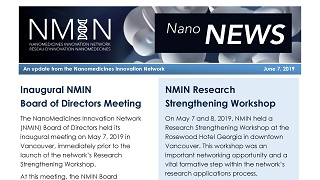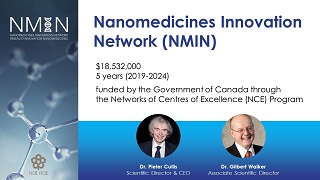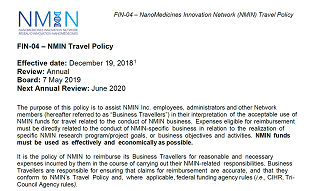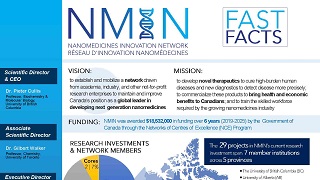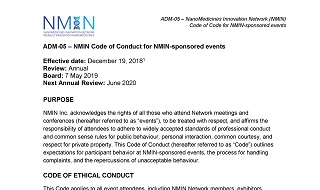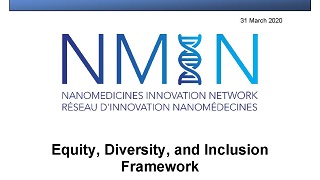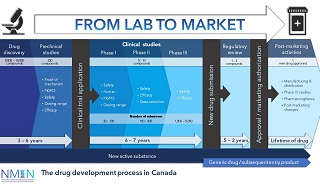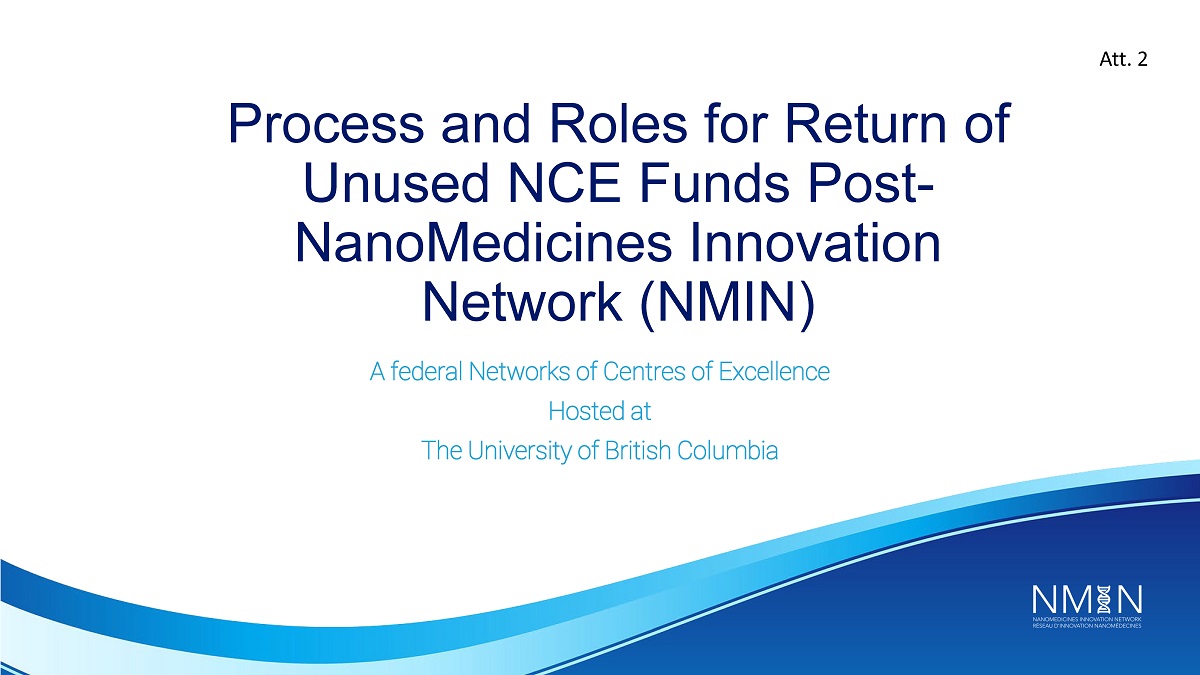NMIN Resources for Network Researchers
NMIN Strategic Initiatives Funding
Open, ongoing call for applications
NMIN’s Strategic Initiatives (SI) program supports rapid responses to just-in-time research, commercialization or knowledge mobilization opportunities.
Budgets may be requested to a maximum of $50,000. Projects must be achievable within a one-year timeframe and be aligned with NMIN’s mission and vision.
Application Guidelines | Questions: danrogers@nanomedicines.ca
NMIN-affiliated researchers, trainees, committee members and other Network participants: please click here to agree to receive NMIN communications, and to allow NMIN to use your information, as an NMIN member, in its communications.
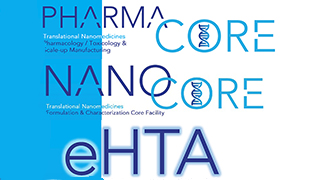
NMIN Core Facilities:
NanoCore |
eHTA |
PharmaCore
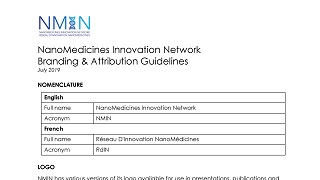
Branding & Attribution Guidelines (includes links to NMIN logos)
NMIN's Online Intellectual Property (IP) Management tools
NMIN’s three interactive tools take you step-by-step through the processes of: deciding if you are in a position to pursue a patent for your IP; determining if you have Freedom to Operate (FTO); and filing a patent—three fundamental components of IP management.
THESE TOOLS ARE NOT ACCESSIBLE ON SMALLER SCREENS OR MOST MOBILE DEVICES.
If you are seeing this text your device’s screen is too small to properly view these tools. Please access this page using a device with a larger screen.
Take a video tour of the tools with Wendy.
Research Commercialization Resources
eHTA Suitability Checklist: developed by NMIN’s eHTA Platform, this checklist will help you assess the potential value of the health technology emerging from your research, to inform your R&D decisions.
Developing an Entrepreneurial Mindset: This recorded NMIN webinar with Dr. Elicia Maine (W.J. VanDusen Professor of Innovation & Entrepreneurship at the Beedie School of Business at Simon Fraser University) introduces researchers to some of the frameworks and skills required to commercialize their inventions.
Entrepreneurship 101: This online, five-week, self-guided course (for a fee)—created by MaRS for aspiring founders seeking a masterclass in entrepreneurship—offers expert mentorship and the tools needed to launch a startup.
Entrepreneurship & Start-up Training: This suite of videos from Innovation Factory features experts covering topics critical to sales, marketing, HR and hiring, intellectual property, and business strategy and growth, including but not limited to: product development, financial literacy, planning, and the differences between various startup funding sources.
Stanford eCorner: Stanford University offers these videos, podcasts and articles on entrepreneurship and innovation.
Mitacs Entrepreneurship Training: Mitacs offers a range of courses about identifying professional surroundings as a potential marketplace, and acquiring the tools to take advantage of opportunities within that marketplace.
Everything you need to know to be an engaged health researcher: In this AGE-WELL/SMRTS webinar, the editors of “Knowledge, Innovation, and Impact: A Guide for the Engaged Health Researcher” share take-home messages and talk about their own experiences with commercializing and mobilizing the outcomes of research.
Training the Entrepreneurs of Tomorrow: This AGE-WELL/SMRTS webinar features Leo Mui, Manager, Entrepreneurship Initiatives, the Impact Centre & Dr. Pooja Viswanathan, CEO, Braze Mobility Inc.
What I wish I knew: a chat with researchers, patent experts & entreprenuers: In this GlycoNet/SMRTS webinar, panelists including researchers, entrepreneurs, and patent experts will share their experiences and stories about their different routes of research innovation, IP protection, technology commercialization, as well as their failures and successes.
Entrepreneurship and Business Partnerships: In this webinar, a panel discusses entrepreneurship and building partnerships.
Using value assessment to inform R&D priorities: In this webinar series, learn how to quantify the potential value of a new health technology for key stakeholders/potential customers at an early stage to reduce your commercialization risk.
Navigating IP Risk: This recorded NMIN webinar, with patent/IP and trademark experts Wendy Lamson and Coleen Morrison, distills the topic down to an easy-to-understand synthesis and provides practical tips and tricks on how to manage IP risk throughout product development to mitigate future infringement.
Best practices in IP management: This recorded NMIN webinar with patent agent Wendy Lamson guides you through the processes of: deciding if you are in a position to pursue a patent for your IP; determining if you have freedom to operate; and filing a patent—three fundamental components of IP management.
IP Management Tools : These three interactive online tools, developed for the NMIN website, simplify IP management in step-by-step guides.
Hands On with IP – Understanding how to leverage IP rights to protect new technologies: In this AGE-WELL NCE/SMRTS webinar, Isi Caulder, Partner at Bereskin & Parr LLP leads a discussion of intellectual property (IP) concepts including insights into the different types of intellectual property from patents and industrial designs to trademarks and copyright as well as strategies for ensuring strategic IP protection for new technologies.
Patents – Maximizing Your Intellectual Property: A GlycoNet/SMRTS webinar.
Intellectual Property 101: In this seminar, Katherine Bonter, Director of Intellectual Property at Clementia Pharmaceuticals, provides an overview of why patent protection is important, the elements of a patent application, and best practices for pursuing a patent application in an academic setting, and she explains many of the terms and definitions used when talking about IP.
IP: Using it to your advantage: In this seminar, Ainslie Little, Senior Director Intellectual Property at BlueRock Therapeutics, discusses the importance of protecting your intellectual property and how this can be used to leverage company creation and give you a competitive advantage. She also speaks about building an IP portfolio and how companies generate and build IP both internally and through partners.
How to do a Patent Search: This seminar covers: the anatomy of a patent document; how to do your own patent searches; public and paid search engines; and how to get the most relevant information from a search.
Canadian Intellectual Property Office online resources:
- IP Toolbox (roadmaps, factsheets, guides, and tools).
- IP Hub (digital platform).
- IP Academy (online learning resources, seminars, training).
- Trademarks (resources and information page).
- Patents (resources and information page).
- Copyrights (resources and information page).
- Industry Design (resources and information page).
- Intellectual property database (Canadian IP databases and downloadable bulk data).
Business Models for NanoMedicine Researchers: This recorded NMIN webinar, series, hosted by the Invention 2 Innovation (i2I) program at Simon Fraser University (SFU), shares tools and insights for creating science-based business models that enable researchers to translate their scientific results into real-world impacts.
Creating a Successful Academic Spin-Out: This recorded webinar by Starfish Medical features experts discussing various factors that influence the success of Academic Spin-Outs.
Startup Series Flexible Learning platform: This course from Entrepreneurship@UBC and UBC Sauder School of Business helps you to acquire basic knowledge on how to effectively build a startup from scratch.
Working with your Tech Transfer Office: This seminar features Namrata Barai, Senior Manager Business Development, Industry Partnerships & Commercialization, The Hospital for Sick Children, explaining what Tech Transfer Offices (TTOs) do to help researchers commercialize their technologies.
Launching a Business in Life Sciences: This seminar features Frederic Sweeney, Entrepreneur-in-Residence at Versant Ventures and Chief Business Officer at Northern Biologics, introducing the fundamental concepts of business planning and fundraising, including how to craft your pitch for the appropriate audience.
Company Valuation Fundamentals: Launching a Business in Life Sciences: This seminar features Jonathan Yeh, Manager Venture Development at CCRM, speaking about the principles that drive company value and the components of a valuation. Using highlights from the regenerative medicine sector, Jonathan talks about what valuation means and offers tips to consider when launching your start-up business.
Finding Talent, Onboarding New Hires, and Performance Management for Start-ups: This video series from Innovation Factory covers practical information about hiring, onboarding, and managing people, with a specific view to the challenges that start-up organizations face. The videos are light on theory and are instead focused on providing “to dos”, checklists, and other helpful tactical resources.
Leadership and Management Training Courses: These online, self-guided courses from Mitacs offer insights into: outcome, risk, and impact assessment; recognizing opportunities; and implementing successful organizational processes in areas such as planning, budgeting, and performance management.
Communication and Relationship Building Training Courses: These online, self-guided courses by Mitacs tell you how to assess situations, identify meaningful solutions, and communicate these solutions to others; and how to create collaborative environments and offer constructive feedback to help a team achieve its goals.
Entrepreneur’s Learning Centre: These free courses from Business Bank of Canada are designed to increase your knowledge and skills as a business leader so you can manage your company with success.
Challenges in Business: These articles & tools from Business Bank of Canada address challenges in business with topics including: starting or buying a business; business strategy and planning; marketing, sales and export; employees; operations; technology; change of ownership; entrepreneurial skills.
Endowing university spin-offs pre-formation: Entrepreneurial capabilities for scientist-entrepreneurs: This article from Innovation Factory discusses: the pre-formation stage of 30 ventures co-founded by a star-scientist-entrepreneur; patents; dynamic capabilities theory; and a process model depicting four pre-formation entrepreneurial capabilities.
Lost in Translation – Navigating a Path from Discovery through to the Clinic: This BioCanRx webinar provides an understanding of the steps necessary to bring a product to patients, including preclinical research, manufacturing, clinical trial applications, regulatory oversight and engagement with Health Canada, engaging key stakeholders for a successful project, and financing a project.
MaRS Innovation Centre online resources:
- Introduction to Market Sizing (free online, self-guided course).
- Introduction to Valuation (free online, self-guided course).
- Getting to Yes: B2B sales for Founders (online, self-guided course for a fee).
- Customer Development Immersive (online, self-guided course for a fee).
- Business Model Validation (free online, self-guided course).
- MaRS Startup Toolkit (resources).
- Go To Market Smarter (video)
Starfish Medical online resources on starting a Diagnostics company:
Financing your discovery: In this webinar, Julia Pomoransky (Turnstone Biologics) shares her insights and lessons learned about securing funding to support your discovery, from initial grant funding to incorporation and pitching to investors.
Mitacs Internship & Fellowship Opportunities : This recorded NMIN webinar describes the Mitacs Accelerate Program and the Mitacs Elevate Postdoctoral Fellowship program, and how companies can benefit fr musing to hire Highly Qualified Personnel.
The Complete Guide to Startup & Scale-up funding in Canada: This article by fundsquire rounds up every Canadian startup and scale-up financing option in one compact place .
Hiring Grants Available For Seed Stage Companies: This article by OKR Financial discusses hiring grants as the best and first non-dilutive government funding for an early-stage company.
The Innovator’s Guide to IRAP: This article by OKR Financial discusses the mission of the National Research Council Industrial Research Assistance Program (NRC-IRAP or IRAP).
Structures and Properties of an Effective Grant Proposal: In this GlycoNet/SMRTS webinar, Dr. David Palmer, Professor from the University of Saskatchewan, discusses the elements of an effective grant proposal.
How to write winning proposals (article)
MaRS Innovation Centre online resources:
- Pitching to Investors (online, self-guided course for a fee).
- Introduction to Investment Readiness (online, self-guided course).
- How do I fund my startup? (article).
MaRS Innovation Centre online resources:
- Five financial considerations for going global (report).
- Seven common barriers to entering a new market (article).
- Are you ready for international growth? (article, free account required).
- Building a holistic strategy using the international expansion scoping canvas (article and tool, free account required).
How to Successfully Partner Internationally to Create Real-World Products: This AGE-WELL/SMRTS webinar describes examples of successful AGE-WELL international partnerships at project and network levels.
other Resources
NanoMedicines Translated: This NMIN program engages NMIN HQP in a hands-on learning process with a communications professional to produce clear-language summaries of their NMIN-supported, peer-reviewed research publications.
Connect and Communicate with Confidence: This recorded NMIN webinar series provides: tools and tips for delivering more effective, compelling presentations; graphic design techniques and resources to increase the impact of visual tools; and an enhanced leadership and mentoring skill set.
Designing Effective Presentations: This guide from Queen’s University explains the use of design in presentations as an effective means of “telling someone something in a visual way”.
Communicating your research in the 21st century: These three short talks from AGE-WELL NCE/SMRTS highlight some key ideas and techniques for communicating research to journalists, through social media, and beyond.
Communication Basics for Virtual Interactions: In this MEOPAR/SMRTS talk Robyn Roscoe discusses adapting communications basics to the virtual/online interactions made commonplace under the COVID pandemic.
Talk Like TED: This Canadian Sleep & Circadian Network/SMRTS webinar provides tips on presenting your research effectively.
Making a scientific poster: These CRIR/SMRTS resources will help you create scientific posters to present your research results in an attractive way that will capture the attention of all types of audience.
Presentations at conferences (oral and poster): Part V of the series of articles “How to Survive After Graduating in Materials Science” by Federico Rosei and Tudor Johnston.
Learn the Art of Presenting: This CRIR/SMRTS bilingual workshop with the finalists of the SSHRC competition shares advice to improve your storytelling skills.
How to do great presentations: what they don’t teach you in grad school: These two Kids Brain Health Network/SMRTS presentations are: High-Engagement Visual Research Stories By Design: Tips, Tricks, Tools; and Designing Effective Presentations: Finding a cure for “Death by Power Point.”
Writing compelling papers: Part IV of the series of articles “How to Survive After Graduating in Materials Science” by Federico Rosei and Tudor Johnston.
The peer-review system: Part III of the series of articles “How to Survive After Graduating in Materials Science” by Federico Rosei and Tudor Johnston.
Preparing Clear-language Research Summaries: This recorded webinar from NMIN presents practical tips and tricks for clear-language writing, outlines the sections and key content of an effective lay summary, differentiates between scientific and lay writing models, and helps you “tell the story” of your research to the general public.
Clear Language Writing: This recorded webinar from Kids Brain Health Network/SMRTS features guest speaker Michael Johnny, who has experience at York University in Knowledge Mobilization and specifically clear language writing in a ResearchSnapshot format.
Illustrating your Research With Sarah Nersesian: This recorded webinar by BioCanRx/SMRTS summarizes the eight steps for creating eye-catching illustrations that clinicians and scientists can use when creating scientific graphics for myriad projects, including manuscript figures, scientific poster presentations, and slides for oral presentations.
How to Speak: This video with Patrick Winston has been an MIT tradition for over 40 years. Offered every January, the talk is intended to improve your speaking ability in critical situations by teaching you a few heuristic rules.
Webinar Accessiblility Tips: This handout from SMRTS offers tips on how to ensure your webinar is accessible.
KT Pathways: This online self-assessment tool and resource guide will help you to identify and improve your KT skills and knowledge.
Intro to Knowledge Transfer: In this MEOPAR/SMRTS webinar, Dr. Melanie Barwick introduces the concept of knowledge translation and provides guidance on how to develop a KM Plan for your research project.
Knowledge Mobilization and You: Knowledge Translation’s Influence on the Research Landscape: This CSCN/SMRTS webinar offers insights on knowledge mobilization/ translation.
Don’t Muzzle Your Science!: This OIRM/SMRTS webinar offers strategies scientists can use to engage with public audiences by Melanie Coulson (Carleton University).
How Science Journalists Work: This OIRM/SMRTS webinar explains what you should expect from the media and what the media expects from you, in a presentation by Ivan Semeniuk (Globe and Mail).
Lost In Translation – Making sure mainstream media gets it: This OIRM/SMRTS webinar discusses using plain language by Joe Sornberger (Canadian Stem Cell Foundation).
Why Communicate Science?: An OIRM/SMRTS webinar by Lisa Willemse (OIRM).
How to make a science research video: In this MEOPAR/SMRTS webinar, marine scientist, research consultant and science communicator Leigh Howarth shares tips on how to make an engaging, entertaining, and educational video.
So you want to create KTEE videos?: This Kids Brain Health Network/SMRTS webinar covers the essentials about creating videos from start to finish, including: identifying the target audience and overall goal, crafting the storyline, where to procure the right equipment, choosing music and working with researchers toward a final product.
Social Media: Building Your Personal Brand: This MEOPAR webinar outlines basic approaches to maintaining a social media presence, audience growth and content marketing.
Social Media For Knowledge Mobilization: This Kids Brain Health Network webinar provides an overview of social media tools with examples of how they are being used to connect stakeholders and collaborators and facilitate the uptake and impact of research.
Twitter for scientists: This CRIR webinar provides tips and tricks for using twitter as part of your scientific work.
Social Media 101: A guide to getting started & promoting your research: This AGE-WELL webinar discusses how researchers can use social media to spread the word about their work: what platforms are best, and how to use each one.
Influencing policy: Selling an Intervention in a Marketplace of Interventions: This AGE-WELL NCE/SMRTS webinar delves into the basics of the concept of intervention evaluation, and discusses the importance of structuring appropriate cost-benefit arguments in the context of research seeking to influence policy.
YorkU Knowledge Mobilization resources: This suite of resources from the KMb Unit at York University provides a comprehensive set of tools to get you up to speed on mobilizing your research results.
UWO Knowledge Mobilization resources: this list of resources and references is from the UWO workshop: Enhancing Research through Knowledge Mobilization.
Research Impact Canada Knowledge Mobilization resources: this repository of resources from Research Impact Canada is intended to help you with your knowledge mobilization activities.
CIHR Equity, diversity and inclusion resources
University of Toronto: EDI in Research & Innovation Resources
Dalhousie University: Equity, Diversity, and Inclusion (EDI) – Research Resources
McGill University: Equity, Diversity and Inclusion Resources
Canadian Centre for Diversity and Inclusion Resources:
Miscellaneous EDI Resources:
- Webinar Accessiblility Tips: This handout from SMRTS offers tips on how to ensure your webinar is accessible.
- Equity, Diversity and Inclusion: A Matter of Research Excellence: A BioCanRX/SMRTS webinar with Karine Morin, Director, Natural Sciences and Engineering Research Council of Canada (NSERC).
- Building a Culture of Equity, Diversity and Inclusion in Science: Tips, Tools and Strategies: In this GlycoNet/SMRTS webinar Dr. Imogen Coe speaks about how to build a culture of EDI in science and shares how one can integrate EDI principles into practice.
- Meaningful Engagement with Northern Communities in Research: Experiences & Lessons Learned: In this MEOPAR/SMRTS webinar a panel discusses approaches to meaningful engagement and knowledge sharing in research when working with Northern communities.
Job Search eBook Library: A selection of ebooks from Cheeky Scientist designed by PhDs working in industry, including PhDs who have had their job search advice published in Nature, Fast Company, the Guardian, Wiley, and more.
Personal and Professional Management Training Courses: These online, self-guided courses from Mitacs will help you to apply self-management techniques to achieve career and personal goals using the process of life-long learning, self-development and managing behaviour.
Personal and Professional Management Training Courses: These online, self-guided courses from Mitacs will help you to apply self-management techniques to achieve career and personal goals using the process of life-long learning, self-development and managing behaviour.
Academic Career Resources:
- Basic advice for surviving after graduation (article).
- Navigating academic scholarship (webinar).
- The Early Career Research Journey (webinar).
- Choices and opportunities for Academic & ‘Academia Adjacent’ careers (webinar).
- Cultivating Your Strengths—A Session for Graduate Students and Early-Career Researchers (webinar).
- Goal Setting for Students and Researchers (webinar).
- Bringing Your Whole Self to Your Science: How to do it & what it offers your communication & career (webinar).
- Writing a scientific review paper (webinar).
- The peer-review system (article)
- How to write winning proposals (article)
- Grant application success: Thinking like a reviewer (handout)
- What’s a postdoc? Are They Necessary, How to Get One, and Life After Becoming a Doctor (webinar).
- Let’s talk about money – a conversation on the remuneration of student researchers (webinar).
- Living Through and Coping With Stressful Times—A Session for Graduate Students (webinar).
- Breaking the Silence—Mental Health and Work-Life Balance in Grad School and Beyond (webinar).
- Wellness In Academia: A Mental Health Discussion (webinar).
Non-Academic/General Career Resources:
- Navigating a Career Path Outside of the Academy (webinar).
- Non-Academic Job Search for Grad Students and Postdocs (webinar).
- Choices and opportunities for Academic & ‘Academia Adjacent’ careers (webinar).
- How to Get a Job You Want (webinar).
- Building Your Resumé (webinar).
Career Exploration & Education resources from the University of Toronto:
- Explore and Start a Career (articles).
- Résumé Workbook (guide).
- Résumé and Cover Letter Toolkit (guide).
- Interview Strategies Guide (guide).
- Creating Your Academic CV (guide).
- Academic Interview Guide (guide).
NMIN Job Preparedness webinars:
- Mastering Interviewing
- Networking Your Way to a Better Career
- Resumes That Work
- Pitching your Innovation: Pro Tips
Project Management webinars:
- The Role of the Project Manager in Research.
- Introduction to project management: Scope and quality.
- Introduction to project management: Stakeholder and risk assessment.
- Introduction to Project Management — Definitions & Principles.
- Project Team Management Series, Part 1: Team Leadership Essentials.
- Project Team Management Series, Part 2: Effective Communication.
- Project Team Management Series Part 3: Effective Delegation.
- Project Team Management Series Part 4: Effective Relationship Building.
- Practical Project Management.
- Research Project Management Q&A.
- Budgeting Basics—Cost Proposal Development.
- Budgeting Basics—Project Cost Management.
- Budgeting Basics—Key Considerations in Budget Cost Management.
- Involving End-Users in All Stages of Research.
CAREER OPPORTUNITIES
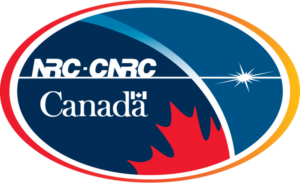 Innovation Investment Advisor – Life Sciences @ NRC
Innovation Investment Advisor – Life Sciences @ NRC
Join the National Research Council of Canada (NRC) to help advance Life Science-related programs, including human health, biomanufacturing and agriculture. Read the job posting
 Various openings @ Precision Nanosystems
Various openings @ Precision Nanosystems
Precision Nanosystems, a global leader in innovative solutions for the discovery, development, & manufacture of novel nanoparticle medicines, is hiring. Positions range from research assistants to scientists. More information
 Work-study positions @ UofT
Work-study positions @ UofT
PRiME is looking for students in Life Sciences / the Rotman School of Management to support innovative projects, to gain skills related to Biotech, Consulting, and the Pharma Industry.
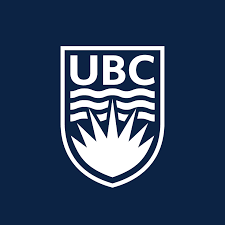 Postdoctoral position in the Leslie lab @ UBC
Postdoctoral position in the Leslie lab @ UBC
The Leslie Lab, Michael Smith Laboratories at UBC, is seeks a Postdoctoral Fellow to work on single-molecule microscopy of RNA-based medicines & vaccines. Read the job posting
 Various openings @ Precision Nanosystems
Various openings @ Precision Nanosystems
Precision Nanosystems, a global leader in innovative solutions for the discovery, development, & manufacture of novel nanoparticle medicines, is hiring. Positions range from research assistants to scientists. More information
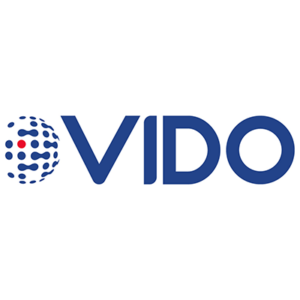 Postdoctoral Fellowship @ VIDO, USask
Postdoctoral Fellowship @ VIDO, USask
Dr. Aneesh Thakur at The Vaccine and Infectious Disease Organization (VIDO), Canada’s Centre for Pandemic Research, seeks an outstanding PDF focusing on subunit mucosal vaccine formulation & delivery. Read the job posting
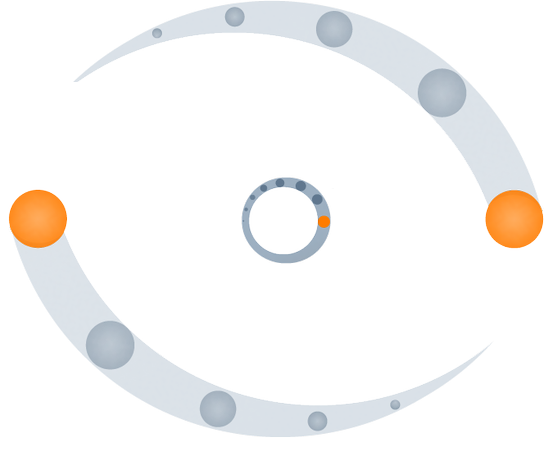
Scientist, Chemistry @ Integrated Nanotherapeutics
Integrated Nanotherapeutics, a Vancouver R&D company developing novel LNP-based therapeutics for cancers, infectious diseases and autoimmune disorders, seeks a research scientist to join their Chemistry team. More information
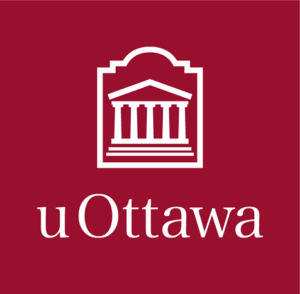 PhD & PDF positions in Nanomedicine @UOttawa
PhD & PDF positions in Nanomedicine @UOttawa
G-Incs Lab in the Faculty of Medicine at the University of Ottawa seeks Ph.D. students & Post-docs for research on diagnostics/ theranostics/ nanomedicines for cancer, cardiovascular and neurodegenerative diseases. More information
